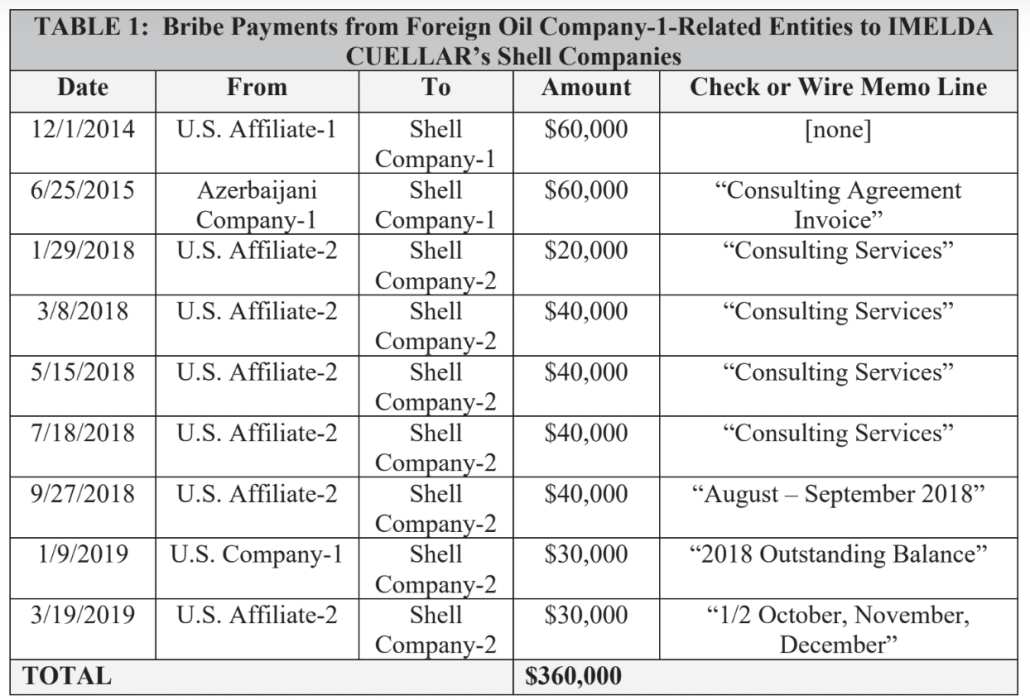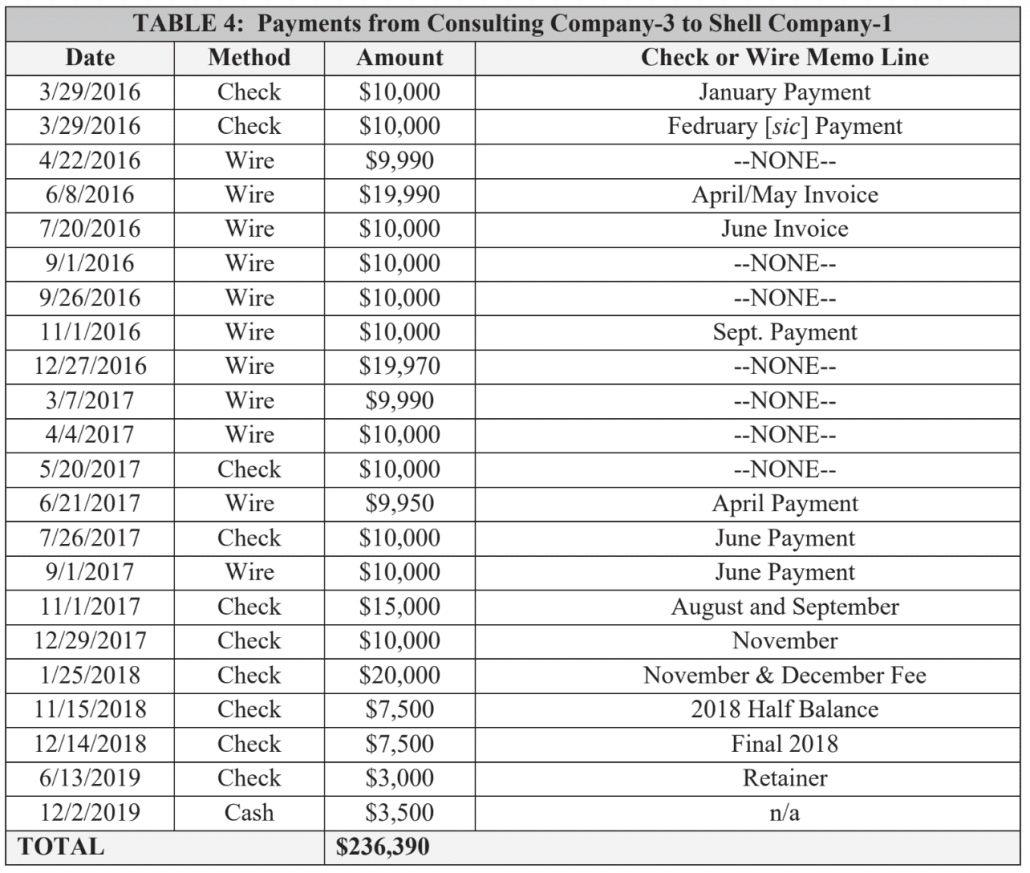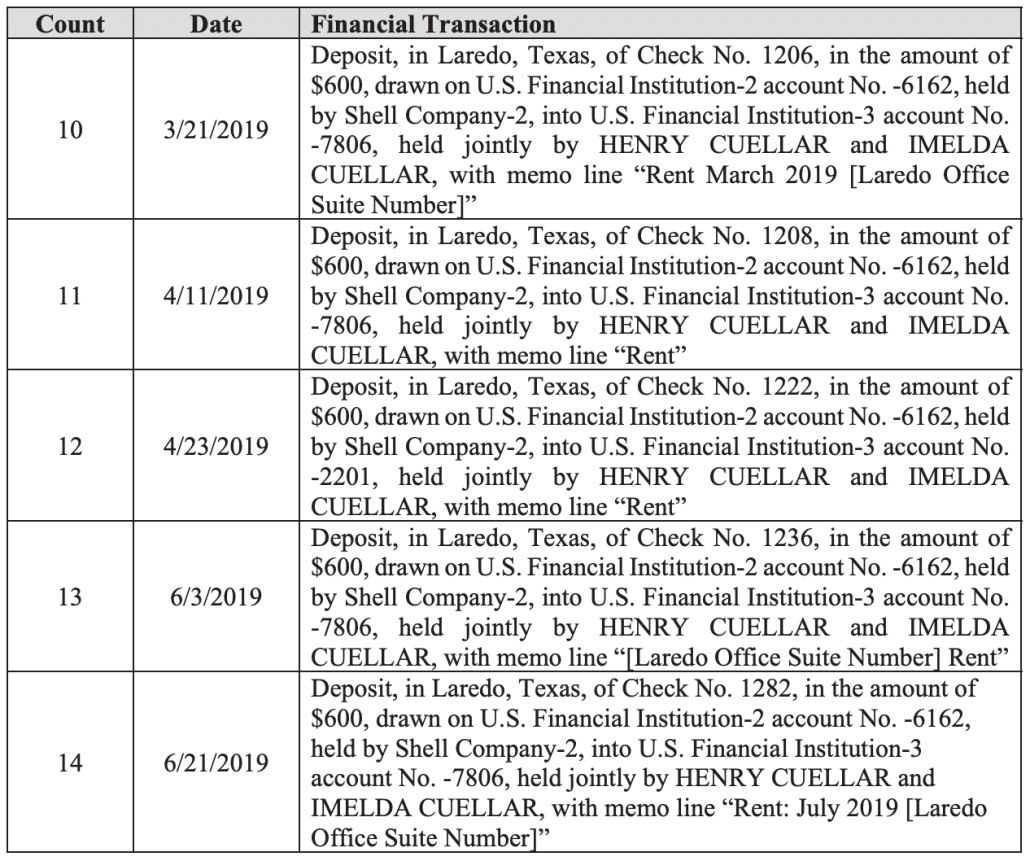The Cuellar Indictment: DOJ Moves to Make 219 FARA a Thing
DOJ indicted Henry Cuellar and his spouse Imelda last Monday on charges that they laundered almost $600K in bribes through sham consulting contracts to Imelda in return for policies favorable to a state-owned Azerbaijani oil company and a Mexican bank.
The case was charged in South Texas, but will be prosecuted by a bunch of DC-based prosecutors.
Acting Deputy Chief Marco A. Palmieri, Acting Deputy Chief Rosaleen O’Gara, and Trial Attorney Celia Choy of the Criminal Division’s Public Integrity Section and Trial Attorney Garrett Coyle of the National Security Division’s Counterintelligence and Export Control Section are prosecuting the case.
There are two cases related to this one, 4:24-cr-00089, 4:24-cr-00113, both of which were charged this year, both of which remain sealed. That means several other people involved in this scheme are also being prosecuted.
There are several key participants in this alleged scheme who might be candidates for either parallel prosecution or cooperation deals. For example, one of the Cuellars’ adult children has allegedly been getting a cut of these deals and, in 2021 (both schemes appear to have paused in 2020), took over the Azerbaijani scheme and got payments to close out the Mexican scheme. As noted below, absent that child’s involvement, at least the Azerbaijani side of the indictment would face timeliness problems.
The indictment also describes that a San Antonio associate of Cuellar’s served as middleman for the contract with Mexico, allegedly laundered through Cuellar’s former Chief of Staff; three paragraphs of the indictment describe conversations the San Antonio associate had with Cuellar back in 2015 that must arise from his direct testimony.
The alleged conduct in this indictment is dated. The Azerbaijani side started over a decade ago, after Cuellar was elevated to Appropriations shortly after the couple traveled to Baku.
22. Shortly after the CUELLARS returned to the United States, Azerbaijani officials discussed recruiting HENRY CUELLAR to promote Azerbaijan’s interests in the United States Congress. On January 23, 2013, an Azerbaijani diplomat emailed the director of Foreign Oil Company-1’s Washington, D.C. office, listing the newly announced membership of the Appropriations Committee’s Subcommittee on State, Foreign Operations, and Related Programs, which included HENRY CUELLAR. The diplomat wrote, “[t]he good news is that Cuellar was just in Baku.” The employee continued, “[w]e need to work with these offices to make sure we build an anti-[Representative-1] coalition.” Representative-1 was a member of the Congressional Armenian Caucus. The diplomat further wrote, “[i]n your Congressional outreach and engagement with [Individual-1] please keep in mind these folks as a top priority.”
The indictment alleges that by February of 2014, the Cuellars were setting up a consulting contract to receive funds.
Because these are dated allegations, there could be some vulnerability regarding statutes of limitation. For example, all the Azerbaijani payments to Imelda’s allegedly sham companies were more than five years ago.
All but two of the payments from Mexico to Imelda ended more than five years ago (and the Mexican side of the payment took place in January 2019, so outside that five years).
Three of the five individual money laundering charges happened more than five years ago — but just barely, a matter of weeks.
The couple’s child assumed — or perhaps resumed — the Azerbaijani relationship, but in 2021 (and specific details of payments are not provided). Three of 13 overt acts described as the payoff for bribes took place in 2020, when the indictment provides no evidence of payment (and the rest are all also more than five years old).
The same child was paid by the San Antonio associate the remainder of Mexican money owed in 2021.
So without including the child, this indictment would be barely viable, perhaps not viable at all with regards the Azerbaijani conduct.
The Cuellars are charged with a bunch of crimes: For both sides of the indictment, with conspiracy, bribery, and wire fraud, plus money laundering and money laundering conspiracy.
In addition, they’re charged with 18 USC 219 and 2, a public official acting as an agent of a foreign entity.
This is a FARA charge that was first used with Robert Menendez last year.
After his indictment was superseded a second time, he took to the Senate floor to describe how he has balanced criticism with support for the countries alleged to have bribed him, what he called diplomacy. He also argued that the government was trying to criminalize working to bring foreign contracts to New Jersey, something members of Congress do all the time.
But Menendez specifically took aim at that statute, 18 USC 219.
This is an unprecedented allegation. And it has never, ever been levied against a sitting member of Congress. Never. And for good reason.
It opens a dangerous door for the Justice Department to take the normal engagement of members of Congress with a foreign government and to transform those engagements into a charge of being a foreign agent for that government.
I want to address the accusations as they relate to me, but I don’t want you to lose sight of how dangerous this precedent will be to all of you. Let me start by describing my history of taking adverse positions to the government of Egypt. My defense of human rights, democracy, and the rule of law in that country, and my stinging criticism of the violation of human rights, democracy, and rule of law issues in Egypt. One fact is indisputable. Throughout my time in Congress, I have remained steadfast on the side of civil society and human rights defenders in Egypt and everywhere else in the world.
[snip]
Does any of this sound like I was on the take with Egypt? Of course not.
[snip]
But you can’t challenge the leader of an authoritarian state in public and among other members of Congress and take actions adverse to their interests and at the same time serve as an agent of that same foreign government.
Over my 30 years in engaging in foreign policy, I don’t know of any dictator or authoritarian leader who is willing to be publicly chastised, or regards someone who dares to do so, as his agent.
Which brings me to the danger of what the Justice Department has created by charging a sitting member of Congress with acting as a foreign agent.
The relevant FARA statute’s definition of agent is broad. It includes anyone who engages in political activities, publicity services, or other certain acts at the order, the request, or at the direction or control of an agent of a foreign principal. Applied to members of Congress, it covers anything that could in any way influence any official or agency of the United States or any section of the public within the United States as to public policy.
So, when members of the Senate from agricultural states went to Communist Cuba to sell rice or poultry or sugar or beef, and were told by the Castro regime they would consider doing so, but the Senators had to convince the US Administration to change US law and lift the embargo and permit credit to take place for such sales, and then came back to the United States and advocated for exactly that request, would that make them a foreign agent of Cuba? I think not.
[Reviews advocating for Iron Dome after a trip to Israel, advocating for Abraham Accords and civilian nuclear program and technology transfers after a trip to Saudi Arabia]
For the government, the sky is the limit if they want to pursue you.
Menendez went on to claim that DOJ’s allegations of giving of cash and gold bars were sensationalized, and that he would explain the real source of them.
It is a fair point, that often members of Congress will advocate for policies that either benefit their states or seem like sound policy even as those same policies may benefit a foreign power.
That said, Menendez did not, here, address the allegation that he gave sensitive information to Egypt and he spun his advocacy for Wael Hana to retain the halal contract for Egypt as someone protecting business in his district.
But he is right that, thus far, the government has not directly tied the cash and gold bars to specific official acts (and its claims about the purpose of the gold bars has evolved with each superseding indictment).
At least on their face, however, the allegations against Cuellar are more straightforward than those against Menendez, because in Cuellar’s case, there were contracts and efforts to create middlemen, contracts that Cuellar reviewed personally. A lot will depend, in the Cuellar case, on the government’s proof that Imelda did nothing in exchange for her contracts, something of which the government is only beginning to provide proof in the Menendez case (and because Menendez’ spouse Nadine is facing some kind of health crisis, she has been severed from the other defendants; her conduct will be presented as second-hand proof when the Menendez trial starts next week).
Menendez challenged the 219 charge against him, arguing that it put a jury in charge of evaluating advocacy that (Menendez argued) should be protected under Speech and Debate. In his challenge Menendez showed how quickly certain stances — advocating for the end to the embargo on Cuba, doing whatever Bibi Netanyahu asks, or funding Ukraine — could become retaliatory cudgels.
It is hard to imagine a criminal prosecution that is more flatly foreclosed by the Speech or Debate Clause.
To appreciate why, some background on FARA is needed. For most Americans, FARA is a disclosure statute: It requires those who meet its definition of “agent of a foreign principal” to register with the Department of Justice. FARA works differently for “public officials,” however, including “Member[s] of Congress.” 18 U.S.C. § 219(c). For them, FARA is not a disclosure obligation, but a criminal prohibition; it is a felony if any public official “is or acts” as an agent of a foreign principal. Id. § 219(a).
As to Members of Congress, the FARA analysis therefore turns exclusively on whether the legislator has acted as a foreign agent. And the definition of “agent” is broad: It includes anyone who (i) engages in “political activities,” “publicity” services, or certain other acts, (ii) “at the order, request, or under the direction or control, of a foreign principal.” 22 U.S.C. § 611(c)(1). The first element sweeps in most of what legislators do: Political activities include anything that will “in any way influence” the government or the public with respect to “domestic or foreign policies” or “the political or public interests, policies, or relations of a government of a foreign country.” Id. § 611(o). The second element, moreover, is so far-reaching that not even a “common law agency” relationship is required to satisfy its terms. Att’y Gen. of U.S. v. Irish N. Aid Comm., 668 F.2d 159, 161 (2d Cir. 1982).
As these elements reflect, § 219 thus operates differently than bribery statutes. The latter proscribe corrupt agreements by public officials. That is why it is possible to prosecute Members of Congress for agreeing to sell legislative acts, without proving or otherwise calling into question those acts themselves. Brewster, 408 U.S. at 526. By contrast, FARA targets actions. See 18 U.S.C. § 219(a) (prohibiting “act[ing]” as agent of a foreign principal). And if those action are legislative in nature, they are immunized as Speech or Debate.
[snip]
The Speech or Debate Clause forecloses the FARA count in this case. But there is a more fundamental constitutional problem with applying § 219 to any Member of Congress—which is perhaps why this has never before been done. For the Executive Branch to accuse an Article I legislator of a crime based on the way he performs his constitutional duties is an affront to the separation of powers and an infringement on the First Amendment. One branch cannot superintend another, let alone its advocacy, without posing serious dangers to the proper functioning of our democracy.
[snip]
Indeed, it takes little imagination to see what winds the government is sowing. Suppose a senator comes back from Israel, and says he will support whatever aid Prime Minister Netanyahu seeks. When he does so, is that at the “order” or “request” of a foreign power? Does it matter whether he would vote that way anyway? Is this really a question for a jury at trial? Now layer on top the risk of selective prosecution. Envision a future President hostile to Ukraine. Under § 219, that President could prosecute any legislative thorn in his side by charging a FARA violation for having promoted military aid at the behest of President Zelenskyy. As this case reveals, an indictment alone wreaks enormous political damage. This threat would produce a deep chill across Congress, freezing the ability of legislators to execute their functions. That is incompatible with our constitutional structure.
Judge Sidney Stein rejected the argument, because Congress itself applied Section 219 to itself and because Section 219 does not limit any constitutional power of Congress.
Menendez moves to dismiss Count Four based on a separation of powers argument. His central claim is that Section 219 violates the Constitution’s separation of powers doctrine when applied to Members of Congress by “delegating to the Executive and Judiciary the power to supervise the daily functioning of the Legislative.” (ECF No. 176 at 41.) According to Menendez, FARA’s language is broad enough to encompass nearly all activities of the Legislative Branch, so long as those activities are at the “order” or “request” of a foreign principal. Therefore, Menendez continues, Section 219 effectively—and impermissibly—tasks the Executive Branch and the Judiciary with supervising and prosecuting the day-to-day activities of legislators. Menendez emphasizes that this creates a significant risk of abuse by the Executive. For example, if Section 219 is applicable to Members of Congress, “a President could prosecute any legislative thorn in his side by charging a FARA violation for having promoted military aid at the behest” of the President of Ukraine (ECF No. 176 at 40), or could prosecute “the House Speaker for advocating a standalone aid-to-Israel bill at the request of Prime Minister Netanyahu.” (ECF No. 187 at 39.) Menendez urges that, under Section 219, “the only thing standing between a Senator on the Foreign Relations Committee and federal prison is a jury finding that he listened to one of the many foreign ‘requests’ or ‘directions’ that he hears out all the time.” (ECF No. 187 at 36.) This supervision of Congress by the Executive Branch, he contends, violates the Constitution’s separation of powers.
However, it is Congress itself that enacted Section 219, and explicitly provided in that statute that it applies to its Members as follows: “For the purpose of this section, ‘public official’ means Member of Congress.” 18 U.S.C. § 219(c). In other words, Congress specifically decided that its Members should be prohibited from acting as foreign agents and, if they do, should be fined or imprisoned. Indeed, far from being “an affront to congressional autonomy” (ECF No. 187 at 39), the decision to impose criminal sanctions on its Members who act as foreign agents was an expression of congressional autonomy. Moreover, while Section 219 may create an opportunity for abuse by the Executive, that risk is substantially mitigated by the fact that the Legislative Branch is uniquely positioned to amend the statute and exempt Members of Congress if it so chooses.
[snip]
[A]s in Rose and Menendez, Congress here has passed a law with a certain requirement for its Members—not to act as agents of a foreign government—and has explicitly empowered the Executive Branch to enforce that prohibition. And, as in Rose and Myers, the risks that any congressional work will be impaired or of presidential abuse are significantly mitigated by the fact that Congress can always amend the statute if it so chooses. These cases strongly support the Government’s position that enforcement of Section 219 against a Member of Congress is not barred by the separation of powers doctrine.
Again, I think Menendez’ case is at least more amorphous than Cuellar’s. It is, for example, easier to see how Menendez took actions that would benefit a businessperson in his district, though even Cuellar will be able to arguing that Azerbaijan was a crucial partner in the war on terror and that easy banking with Mexico is critical to his Laredo constituents.
I’m not saying DOJ is wrong to crack down when the spouses of members of Congress take payments from foreign countries directly affected by the policy choices their spouses make; they probably should be cracking down on such sham contracts more generally.
But DOJ is doing something new with these 219 prosecutions. We’ll see more clearly how that works in practice as Menendez goes on trial.


